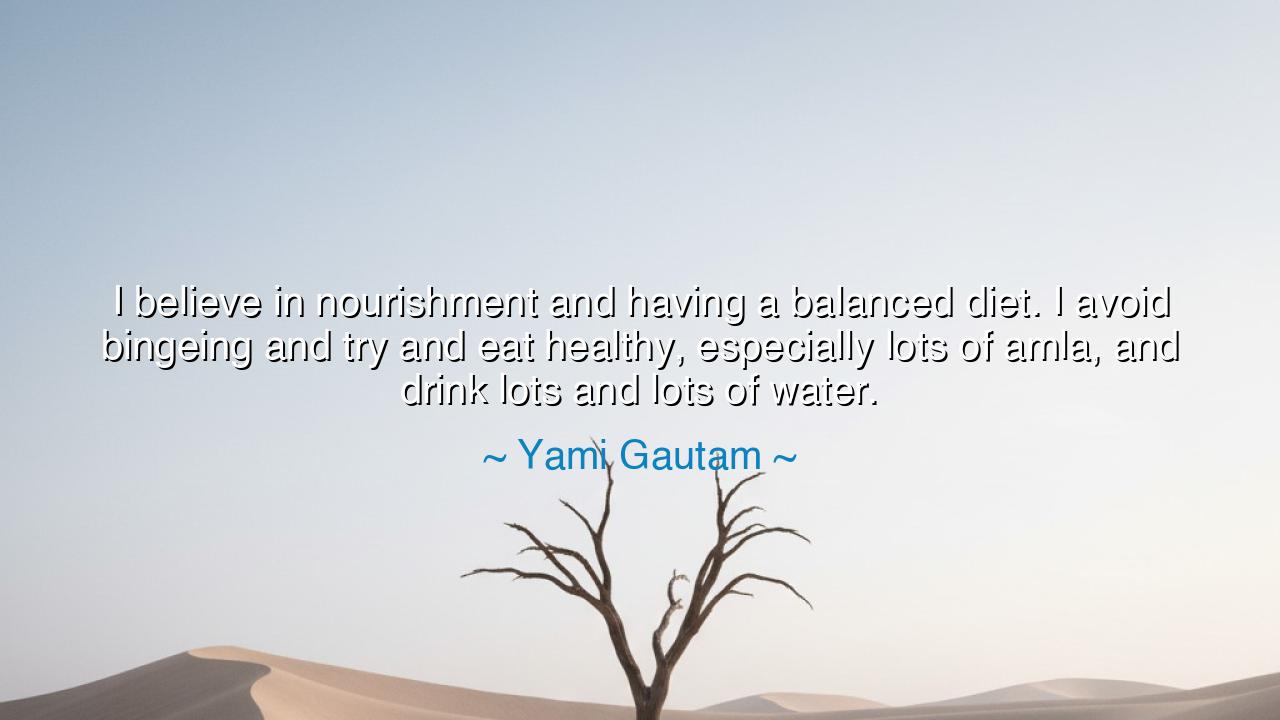
I believe in nourishment and having a balanced diet. I avoid
I believe in nourishment and having a balanced diet. I avoid bingeing and try and eat healthy, especially lots of amla, and drink lots and lots of water.






The words of Yami Gautam, “I believe in nourishment and having a balanced diet. I avoid bingeing and try and eat healthy, especially lots of amla, and drink lots and lots of water,” flow like a clear mountain spring — simple, yet full of life-giving wisdom. In these words lies not merely a prescription for the body, but a philosophy for the soul. To nourish oneself is not only to feed the flesh, but to honor the sacred temple that houses the spirit. In every act of mindful eating, there is gratitude to the earth, reverence for creation, and acknowledgment of one’s place in the great web of life.
The ancients, in their infinite understanding, taught that the body is the vessel through which the spirit moves. To neglect it is to dull the light within. To binge, to consume without measure or awareness, is to turn abundance into imbalance — to take more than one needs, and in doing so, create disharmony within and without. Gautam’s words remind us of the eternal law of balance — that to sustain the flame of life, one must tend it with care, not drown it in excess. Her belief in a balanced diet echoes the old teachings of Ayurveda, where each food, each herb, each drop of water, was seen not as mere matter, but as medicine, each carrying the memory of the sun, the moon, and the soil.
When she speaks of amla, the humble Indian gooseberry, her voice joins the chorus of sages who for centuries have praised its power. Rich in vitality, it was called the “fruit of immortality,” believed to renew life itself. The great physician Charaka wrote in the ancient texts that those who consume amla daily are blessed with vigor, clarity, and long life. It is as though Gautam, in her modern grace, continues this ancient lineage — bridging past and present through conscious nourishment. Her faith in the healing touch of nature teaches us that the earth has already provided what we need to thrive; our task is only to listen, to respect, and to partake with awareness.
There is an echo of self-discipline in her words — a quiet strength that refuses to yield to the temptations of modern indulgence. In a world where the table groans under endless variety and the spirit grows weaker with every careless bite, she chooses restraint, not as deprivation, but as freedom. To eat mindfully, to drink deeply of pure water, is to declare independence from the tyranny of excess. This is no small act — it is a victory of consciousness over craving, of order over chaos. Like the warriors of old who honed their bodies to carry the weight of their purpose, she teaches that nourishment is not gluttony, but preparation for greatness.
Reflect upon the story of Queen Hatshepsut of Egypt, who reigned with power and grace over the ancient Nile. It is said that she maintained her strength and radiance through simple, balanced meals of grains, fruits, and herbs, and by drinking from sacred wells believed to cleanse both body and mind. While empires around her sought riches in gold, she sought riches in vitality. Her rule endured, not through indulgence, but through equilibrium — proof that the art of living lies not in excess, but in harmony. So too must we, in our daily lives, seek this harmony of nourishment, so that our bodies may serve as steady vessels for the journey of the spirit.
In every sip of water lies a metaphor. The ancients taught that water is the carrier of life, the purifier of all impurities, the gentle yet powerful teacher of flow. To drink it abundantly, as Gautam counsels, is to remind oneself to stay fluid, adaptable, and humble. Just as the rivers carve valleys not through force, but persistence, so too does the practice of daily nourishment shape our destiny — slowly, silently, but with unyielding power. The body, when cared for rightly, becomes the silent ally of the soul, lending it the strength to dream, to create, and to love.
Thus, let this be the teaching: To nourish oneself is a sacred duty. To eat with balance is an act of respect toward the divine spark within. Let no one fall prey to the mindless habits of binge and neglect. Instead, eat with gratitude, drink with awareness, and honor your body as you would honor the altar of a temple. Begin your days with foods that heal — perhaps the tang of amla or the cool purity of water — and end them with thanks for the sustenance that life provides.
For in these small, steady acts of mindfulness lies the key to a radiant existence. The wise do not chase after fleeting pleasures; they cultivate enduring well-being. And so, to those who will listen, Yami Gautam’s words ring as both counsel and command: Feed your body with love, your mind with peace, and your spirit with light — and you shall walk the earth in the grace of harmony.






AAdministratorAdministrator
Welcome, honored guests. Please leave a comment, we will respond soon